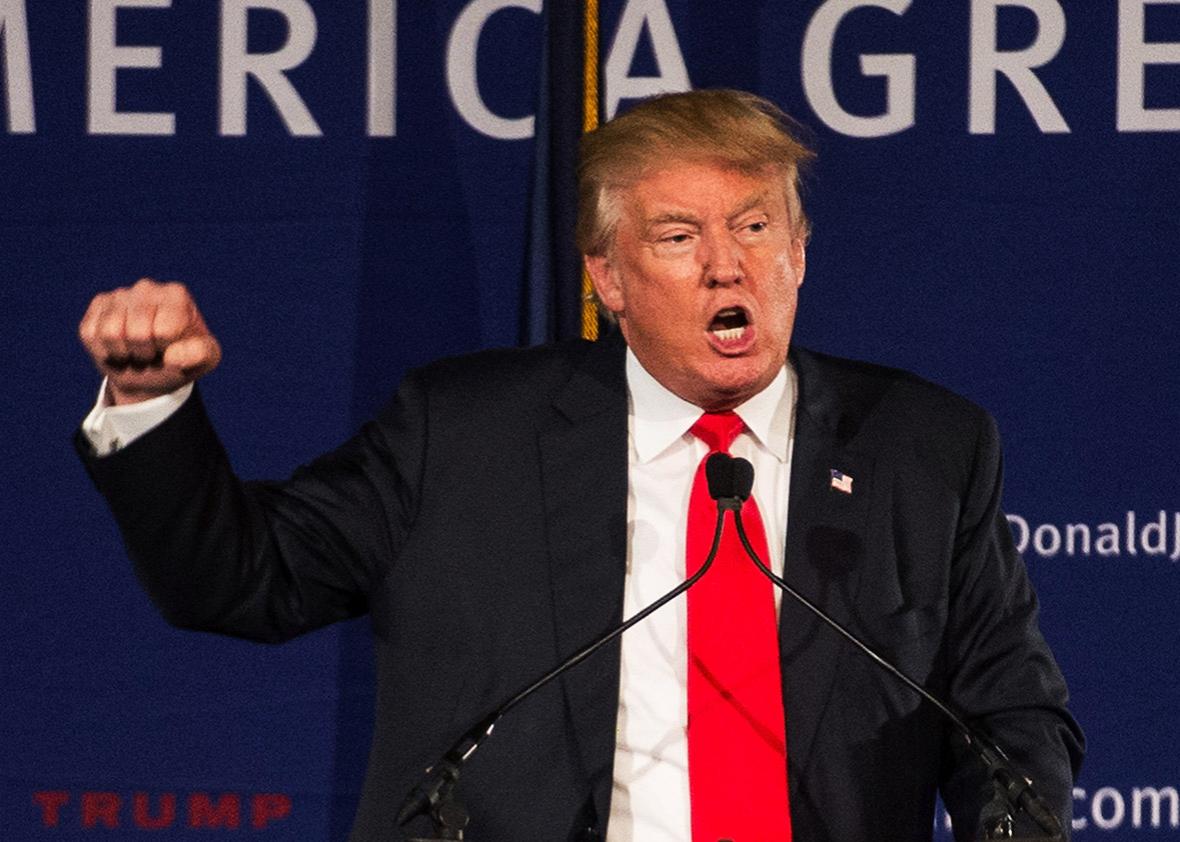Once again, Donald Trump has taken the subtext of the Republican race for president and made it text.
On Monday, his campaign issued a statement: “[O]ur country cannot be the victims of horrendous attacks by people that believe only in Jihad, and have no sense of reason or respect for human life.” As such, he said, we have to have a “total and complete shutdown of Muslims entering the United States.”
Last month—in the wake of the Paris attacks—Republicans united in opposition to America accepting Syrian refugees. “The Statue of Liberty says ‘bring us your tired and your weary,’ ” declared former Arkansas Gov. Mike Huckabee. “It didn’t say ‘bring us your terrorists and let them come in here and bomb neighborhoods, cafés, and concert halls.’ ” Sen. Rand Paul also used the attacks as a justification for refusing refugees. “I think Paris should wake us up to the fact that we can’t just let anyone come to this country,” he said.
Some candidates wanted, specifically, to screen refugees by religion. “President Obama and Hillary Clinton’s idea that we should bring tens of thousands of Syrian Muslim refugees to America—it is nothing less than lunacy,” said Texas Sen. Ted Cruz. “On the other hand, Christians who are being targeted for genocide, for persecution, Christians who are being beheaded or crucified, we should be providing safe haven to them.” Just last week, Paul sponsored—and Cruz voted for—an amendment that would bar immigration from more than 30 Muslim countries that have terrorist networks in them.
The proximate arguments are over Syrian refugees, a small fraction of the Muslim tourists, students, and workers who come to the United States every year. But the subtext is clear: Republicans are debating whether they want Muslims coming to the country at all. Trump has made that plain and moved the needle from rejecting refugees to rejecting Muslims—including Muslim Americans abroad—writ large.
The Republican chairs in Iowa, New Hampshire, and South Carolina have denounced Trump’s comments, and a few candidates—Jeb Bush and Lindsey Graham in particular—have blasted Trump for his proposal. “Donald Trump is unhinged. His ‘policy’ proposals are not serious,” said Bush on Twitter. “[Trump] is a race-baiting, xenophobic, religious bigot,” said Graham in an interview with CNN. “You know how you make America great again? Tell Donald Trump to go to hell.”
But Trump is just skating to where the puck was going. Nothing here is qualitatively different from what Republicans have been saying for the past month or longer.
The question, now, is what happens next? For that, we should look to the two leading, non-Trump candidates in the race: Marco Rubio and Ted Cruz. Both criticized Trump’s call for a Muslim moratorium but not on moral grounds. “I disagree with Donald Trump’s latest proposal. His habit of making offensive and outlandish statements will not bring Americans together,” said Rubio on Twitter, treating Trump’s rhetoric as a standard campaign controversy and not a direct attack on core American values. Cruz was even milder. “That’s not my policy,” he told reporters. (Outside of politics, at least one conservative thinker at National Review has endorsed Trump’s concept without endorsing Trump himself.)
Both Cruz and Rubio are playing a subtle game. They will not back Trump or his idea, but they don’t plan to alienate his voters either. They will sit at the divide between the mainstream and far right and hope to benefit if and when Trump leaves the race. Viewed from their perch in the GOP, this makes sense. Trump represents a large and meaningful minority in the Republican Party electorate, but he has few formal ties to the GOP. A full attack from the entire party—an attempt to destroy his stature within the primary race—risks a schism. Trump would leave, his voters would leave, and the Republican Party might face an independent Trump bid for the White House. In other words, a GOP that denounced Trump in unison is one that might easily lose the next election.
No one wants to pay that price, and so some Republicans attack Trump, while others stay out of the breach. Even Paul Ryan is doing this dance. In a press conference Tuesday morning, the House speaker came out against Trump. “Freedom of religion is a fundamental constitutional principle. It’s a founding principle of this country,” Ryan said. “This is not conservatism. What was proposed yesterday is not what conservatism stands for. More importantly, it’s not what this country stands for.” But, when asked about the outcome of the GOP race, Ryan said this: “I’m going to support whoever the nominee is.”
Republican leaders want to eject Trump from the party, but it’s not clear they can without tearing the GOP apart. This doesn’t just leave Trump with the advantage; it makes him the key figure in the Republican primary. Trump is driving the narrative of the race and the approach of the candidates. Trump is bringing radical ideas to the mainstream of public opinion. Trump is inspiring, encouraging, and empowering the far right in American politics. Trump is seeding the ground for a future movement, centered on his aggressive ultranationalism.
Trump isn’t locked in to the Republican Party; the Republican Party—and the rest of us—are locked in with him.
Read more of Slate’s politics coverage:
